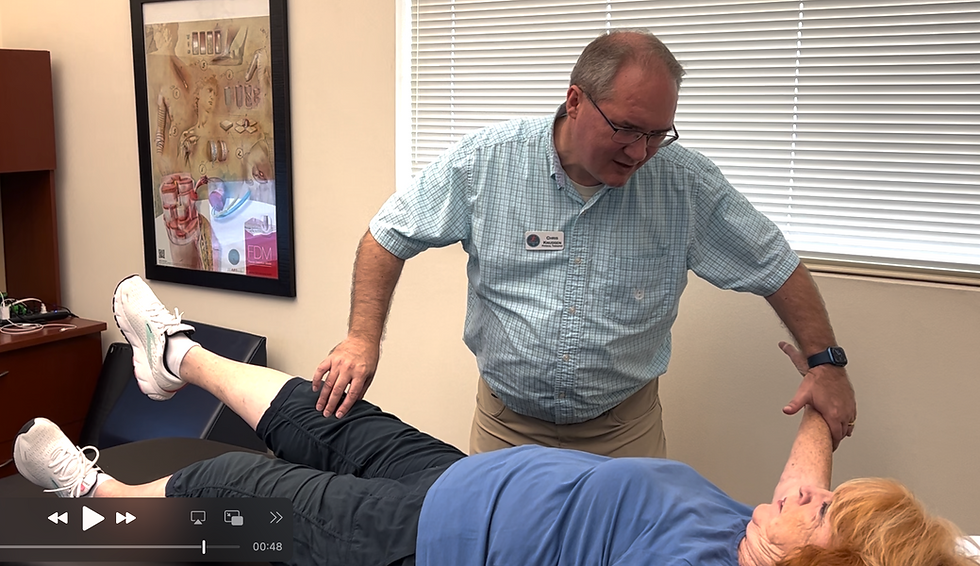You Can Recover From Whiplash
- muscleiq2
- Sep 11, 2021
- 3 min read
Updated: Sep 27, 2021
by Dr. Chris Knudsen
Muscle IQ - Physical Therapy
9-11-2021
There are a lot of people suffering from neck pain and headaches after a car accident. The label they are given is Whiplash. But, what is whiplash? And, what are your chances of a full recovery after a whiplash injury due to a motor vehicle accident? At Muscle IQ Physical Therapy we treat whiplash using evidence-based interventions, and our objective measurements show we have better recovery rates than what is accepted as the normal recovery in most research studies.
What is whiplash?
Whiplash is the most common diagnosis after a motor vehicle accident. One website says, "Whiplash associated disorders (WAD) is the term used to describe injuries sustained as a result of sudden acceleration-deceleration movements. It is considered the most common outcome after "noncatastrophic" motor vehicle accidents.[1] The term WAD is often used synonymously with the term Whiplash however whiplash refers to the mechanism of injury rather than the presence of symptoms such as pain, stiffness, muscle spasm and headache, in the absence of a lesion or structural pathology."
How Long Does it Take to Recover from Whiplash?
According to the latest research only 50% of patients with whiplash will fully recover. Most whiplash patients stop seeing much progress just three months after their accident. In most studies, a successful outcome from whiplash is when the patient improves function by 10%.
What Factors Affect a Poor Recovery from Whiplash?
There are several studies that have been done to analyze why a whiplash injury might not recover well.
One such study, entitled 'Prognostic Factors Associated With Minimal Improvement Following Acute Whiplash-Associated Disorders' (Dufton, J. et al., Spine: September 15, 2006 - Volume 31 - Issue 20 - p E759-E765) says that there are several factors that may influence whether someone will recover from whiplash. The most notable factors for me in this study were the following:
Increasing lag time between injury date and presentation for treatment
Higher initial pain intensity
At work at entry to the clinic.
Why would these factors make it harder for someone to recover fully from whiplash? I think it is pretty clear. If you have seriously injured yourself in a car accident and you avoid going to phy
Another study, entitled 'Delayed recovery in patients with whiplash-associated disorders. by
John A.Dufton lists the recovery success rates of whiplash victims based on three groups. The groups are separated by the time between the accident and the patient starting physical therapy. The groups acute (<91 days), early chronic (91 days to 6 months), and chronic (>6 months). This study showed that those who started therapy greater than 6 months after the accident had a recovery success rate of 52.1%. Early chronic patients had a recovery success rate of 61.4%, and acute patients were 72.3%.
acute injury (<91 days since injury) were i
nitially compared to patients with chronic injuries (6 months since injury). Subsequently, a third group of patients with early chronic p
resentations (>91 days but <6 months since injury) w
The next study, from the Journal of Orthopedic and Sports Physical Therapy, says that only 50% of people with whiplash will recover.
Figure 1:

Another study says that most people get poor treatment after whiplash. "As illustrated earlier, few interventions have been demonstrated to provide clinically important benefits to patients with WAD I-II.12 It is an unsettling fact that most interventions used in clinical practice are not supported by scientific evidence. The Neck Pain Task Force recommended that educational pamphlets alone, soft coll
ars, rest, and passive modalities (heat, cold, diathermy, and hydrotherapy) have not been shown to confer any benefits to patients with acute WAD.12 Moreover, there was not enough evidence to comment on the effectiveness of spinal manipulation, traction, medications, and injections. Therefore, it is likely that a high proportion of patients are treated every day with ineffective or unproven clinical interventions.21 "





Comments